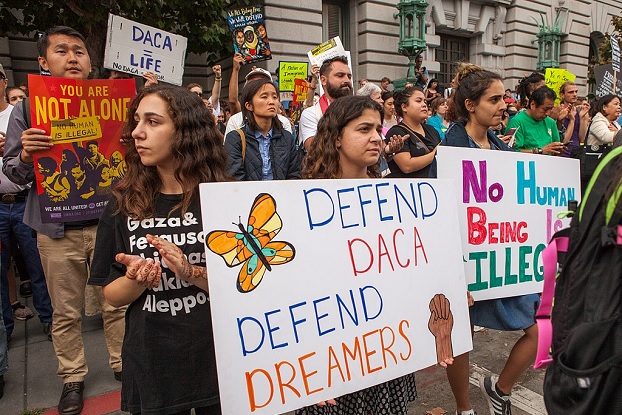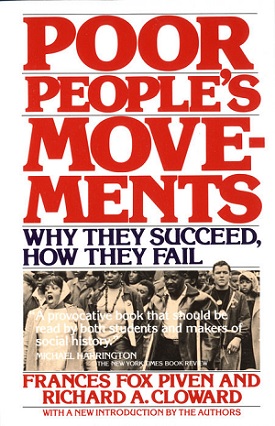
In early February, Democrats and Republicans negotiated a spending bill that would effectively keep the government up and running. At first, it seemed that both sides got what they wanted. The GOP succeeded in siphoning off more money towards the military while important social welfare programs that the Democrats supported were finally funded. However, it soon became clear, that a solution for recipients of Deferred Action for Childhood Arrival (DACA), known as “Dreamers,” had been excluded from the final compromise.
I was dumbfounded when I found out what happened. I was hoping the Democrats were willing to shut down the government until the Republicans would have no choice but to allow the DACA program, which protects segments of the undocumented population, to continue as it did under President Obama.
The DACA program had allowed many in the undocumented community the opportunity to pursue their aspirations here in the U.S., in the land they’ve grown up in. However, Trump’s decision to end the program has put countless peoples’ lives on hold, as the status of thousands of undocumented people will soon be at risk for deportation.
“The most marginalized communities cannot depend on the leadership of either political party.”
Despite this reality, the Democrats, led by Senator Charles Schumer, decided against shutting down the government and instead, to negotiate with the Republicans. Shutting down the government was the only leverage that the Democrats had. It was yet another moment of frustration, and it clarified for me what I’ve been thinking during this past year of resistance against Trump: that the most marginalized communities cannot depend on the leadership of either political party.
The only way for people from oppressed communities, including the undocumented, to be taken seriously is by working beyond the electoral system. This means leading sit-ins, organizing rallies, and nonviolently disrupting the status quo.
THE ELECTORAL DEAD-END
Throughout U.S. history, the poor and people of color didn’t expect legislators and others in power to empathize or care about them. After all, this country was built to exploit their ingenuity and labor. Instead, poor and black and brown people demanded what they deserved by disrupting daily life and consequently, by adding pressure onto the system, rather than organizing within it.
For example, during the Great Depression, the unemployed, often out of sheer desperation, would rally outside relief centers, demanding that programs to help them pay for shelter and daily necessities would not be cut. Whenever a local politician would announce a possible cut (or “reform”) of the welfare system, crowds would soon form around relief centers, willing to disrupt until those programs were restored. Similarly, it was workers taking over factories and throwing out their bosses that forced the federal government to recognize their demands.
In fact, many of the traditional unions, like the American Federation of Labor (AFL), were against strikes and direct action by workers. They wanted workers to join their union and help lobby for their interests in Congress, like every other formal interest group. But the workers themselves, again from a place of desperation and frustration with the system, weren’t satisfied with mainstream politics and maneuvering, and who wanted better lives for themselves and others, chose to consistently disrupt the daily activities within industrial plants, until they received what they felt they deserved.
Prominent social scientists, Frances Fox Piven and Richard A. Cloward, document these strategies by marginalized peoples in their now classic work, Poor People’s Movements: Why They Succeed, How They Fail. They explain that only through direct actions, such as sit-ins and strikes do marginalized groups, including African Americans during their fight for civil rights, win concessions from those in authority.
However, the moment when agitation subsides, and elements within a movement are co-opted by the status quo, the momentum a movement may have can be contained.
In the case of the welfare movement in the late 1960s (which fought to expand upon welfare programs that the poor and working-poor need to survive), once organizations were formed to lobby politicians on behalf of those on welfare, most of the attention was diverted away from street protests and rallies. So instead of building pressure through direct action on relief centers, which had caused panic among mayors of major cities, these lobbying groups paid more attention to mainstream political activity, like meeting with politicians to discuss policy.
This sapped the energy of the movement, and eventually, pacified what was left of its members on the ground. The same pattern occurred among labor uprisings and the struggle for civil rights, when leaders of both movements were absorbed into the political mainstream by being offered positions in government.
“At the same time that government makes efforts to reintegrate disaffected groups, and to guide them into less politically disturbing forms of behavior,” Piven and Cloward write, “it also moves to isolate them from potential supporters and, by doing so, diminishes the morale of the movement.”
Time and again, it’s been proven that once marginalized groups give up on protest and transition into forming interest groups to lobby on Capitol Hill, the less threatening they become to the status quo. And once political parties, including the Democrats, don’t feel a pressure to act, they renege on their promises to groups they claim to be representing, such as the poor and people of color, and choose to co-opt them instead for their campaigns to win office.
BEYOND THE ELECTORAL
Five years ago, I wrote my first article on the subject of immigration reform. I interviewed mostly Asian Americans advocating for immigration reform, and also, spoke with undocumented Asian Americans about their experiences. One of the young men I spoke to at the time was born in the Philippines but grew up here in the U.S. After finding out he was undocumented, he understandably was upset.
“Every day after that, it was really hard to get out of bed,” he told me.
Eventually, he did recover emotionally. However, the course of his life had changed knowing that at any moment, everything he knew could be ripped away.
“I can’t help but feel as if the Democrats had abandoned their real base of support, which includes the Dreamers…”
I’m thinking about him again and others I’ve met along the way, who have struggled to maintain some semblance of normality while a dark cloud looms over them. I can’t help but feel as if the Democrats had abandoned their real base of support, which includes the Dreamers, who even if they cannot vote, have been important in organizing around important issues that the Democrats claim to be fighting for.
I understand the importance of compromise and that the Democrats did win some significant policies, such as extending a children’s health insurance program. But it still doesn’t wash away the reality that those compromises were done at the expense of other vulnerable peoples. And given the times we’re in, with a white supremacist in the White House and rising levels of anti-immigrant feeling among his base, it is naïve and cruel to think that now, the Republicans would be willing to discuss immigration reform without the threat of a government shutdown.
Breaking: Supreme Court extends relief for "Dreamers," refuses to rule now on Trump immigration plan https://t.co/4FXauCYAEX pic.twitter.com/3Lw1JkZFu1
— Los Angeles Times (@latimes) February 26, 2018
Even though the Supreme Court has just rejected Trump’s decision to end the DACA program, and therefore, has kept it protected for now, it is important to remember that the end goal is to have an immigration system that is humane and which allows all undocumented peoples the chance at citizenship. Further, if Trump wins a second term, he can again threaten the program.
Last Friday, I had the privilege of speaking before workers on campus, fighting for a living wage. I relayed to them the message that no one in power was suddenly going to swoop in and help us.
Instead, the only way for those in authority to do something is not to appeal to them, or beg. The only way for us to get what we need, whether it’s fighting for the living wage or for a humane immigration system, is to demand it and struggle for it, together.
Rutgers students, workers march to demand $15 minimum wage on campus (VIDEO) https://t.co/ehmv1NjaW5
— Rutgers AAUP-AFT (@ruaaup) February 27, 2018
Throughout our country’s history, this has been the formula that has worked and keeps working for those at the bottom. Fannie Lou Hamer and Fred Hampton knew this was true when they led boycotts and sit-ins in their struggle against white supremacy. The workers of the CIO and other labor unions during the Great Depression knew this was true when they took over factories and tossed out their bosses. Those in the streets of Ferguson and Baltimore know this is true when they finally led an uprising against those who oppress them.
Only through direct pressure against the powers that be do we actually win.
Specifically, this means applying nonviolent direct pressure to Democrats. This means leading sit-ins, marches, protests, and doing what we must to nonviolently disrupt the status quo. Since the Democrats claim to be fighting for the poor and oppressed, it is our job to shame them and expose their hypocrisy. By doing so, we will make them realize they cannot expect us to vote for them simply because they are anti-Trump.
We demand and deserve more.
* * *
Sudip Bhattacharya is a Rutgers University Ph.D. student in political science who focuses on race and social justice. He has a Master’s in journalism from Georgetown University. His work has been published at CNN, The Washington City Paper, The Lancaster Newspapers, The Daily Gazette (Schenectady), The Jersey Journal, Media Diversified (Writers of Colour), Reappropriate, AsAm News, The New Engagement, and Gaali Gang.













